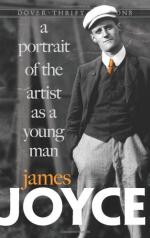But he had been forewarned of the dangers of spiritual exaltation and did not allow himself to desist from even the least or lowliest devotion, striving also by constant mortification to undo the sinful past rather than to achieve a saintliness fraught with peril. Each of his senses was brought under a rigorous discipline. In order to mortify the sense of sight he made it his rule to walk in the street with downcast eyes, glancing neither to right nor left and never behind him. His eyes shunned every encounter with the eyes of women. From time to time also he balked them by a sudden effort of the will, as by lifting them suddenly in the middle of an unfinished sentence and closing the book. To mortify his hearing he exerted no control over his voice which was then breaking, neither sang nor whistled, and made no attempt to flee from noises which caused him painful nervous irritation such as the sharpening of knives on the knife board, the gathering of cinders on the fire-shovel and the twigging of the carpet. To mortify his smell was more difficult as he found in himself no instinctive repugnance to bad odours whether they were the odours of the outdoor world, such as those of dung or tar, or the odours of his own person among which he had made many curious comparisons and experiments. He found in the end that the only odour against which his sense of smell revolted was a certain stale fishy stink like that of long-standing urine; and whenever it was possible he subjected himself to this unpleasant odour. To mortify the taste he practised strict habits at table, observed to the letter all the fasts of the church and sought by distraction to divert his mind from the savours of different foods. But it was to the mortification of touch he brought the most assiduous ingenuity of inventiveness. He never consciously changed his position in bed, sat in the most uncomfortable positions, suffered patiently every itch and pain, kept away from the fire, remained on his knees all through the mass except at the gospels, left part of his neck and face undried so that air might sting them and, whenever he was not saying his beads, carried his arms stiffly at his sides like a runner and never in his pockets or clasped behind him.




